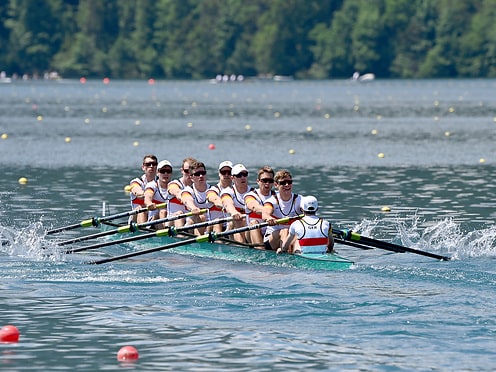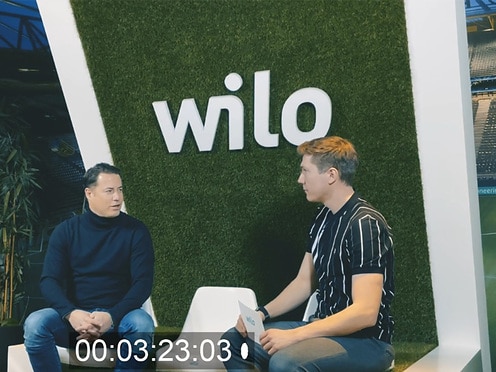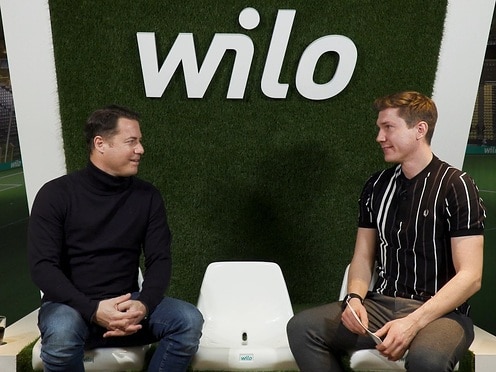Happy 50th - to the most beautiful stadium in the world
From the early days at the Rote Erde to the Yellow Wall
When the new Westfalenstadion was inaugurated by 54,000 fans right next to the old Rote Erde stadium on 9 April 1974, this was the starting point for the history of a stadium that still fascinates players and fans all over the world today. Even in the motherland of football, British newspaper The Times named Dortmund’s football temple the “best and most beautiful stadium in the world” after its third expansion in 2009. Elaboration: “Huge end terraces that fling noise down onto the playing area with a deafening intensity. This place was built for football fans to express themselves.” Anyone who has ever watched a match live on Strobelallee will remember the experience, filled with moments where they got goosebumps. This is because 25,000 of the 81,365 spectators in the “South” (grandstand) alone stand in support of Borussia Dortmund as “The Yellow Wall”. Football history was and is being written here. We’re not just talking about the chapters that include Borussia Dortmund or the UEFA Cup final with Liverpool FC vs Deportivo Alavés, but also many international matches. Highlights include those hosted by the stadium in the 1974 and 2006 World Cups. The next football event is just around the corner in time for the 50th anniversary. Six matches of the European Championship are set to take place at the stadium.
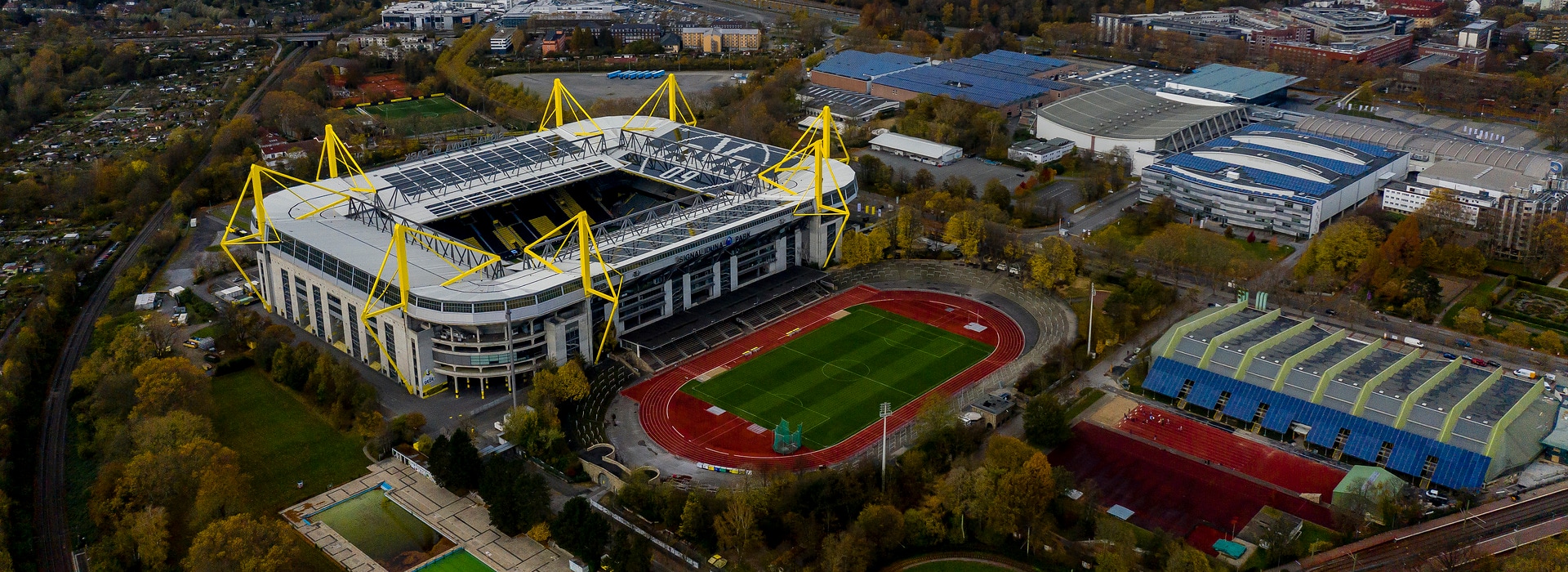
Ten goosebump moments for football eternity.
Decisive goals, exhilarating victories and major titles. We’ve collected ten unforgettable moments from SIGNAL IDUNA PARK:
9 April 1974: The gates of the newly built Westfalenstadion are opened for the first time during a grand ceremony. 54,000 spectators stream in and celebrate the first goal in the stadium’s history at 6.18 pm. Scored by a young lady, Elisabeth Podschwadtke, in the pre-match between TBV Mengede and VfB Waltrop. Even though Borussia Dortmund’s regional league team subsequently lost 3-0 to arch-rivals Schalke 04, the big picture has not changed: Not only did the stadium itself set completely new standards, but also the appreciation for women's football.
17 April 1974: With the rematch of the World Cup classic between Germany and Hungary, the DFB hands over the new football temple as the official stadium of the 1974 World Cup to all fans, who will also be able to experience the first World Cup match between Scotland and Zaire there a few weeks later.
23 June 1976: Borussia Dortmund has the chance to return to the Bundesliga in a relegation match. After a narrow 1-0 victory in the first leg in Nuremberg, the match in Dortmund is also a very close contest. Following goals from Geyer and Hartl, Nuremberg equalised again and again and could destroy all black and yellow dreams with just one more goal. That was until Lothar Huber set off on a final sprint in the 89th minute and fired a dry left-footed shot, sending Borussia Dortmund flying back into the top division. The stadium is turned upside down during the celebrations, some fans find themselves five rows down and Lothar Huber returns to the dressing room wearing only his pants.
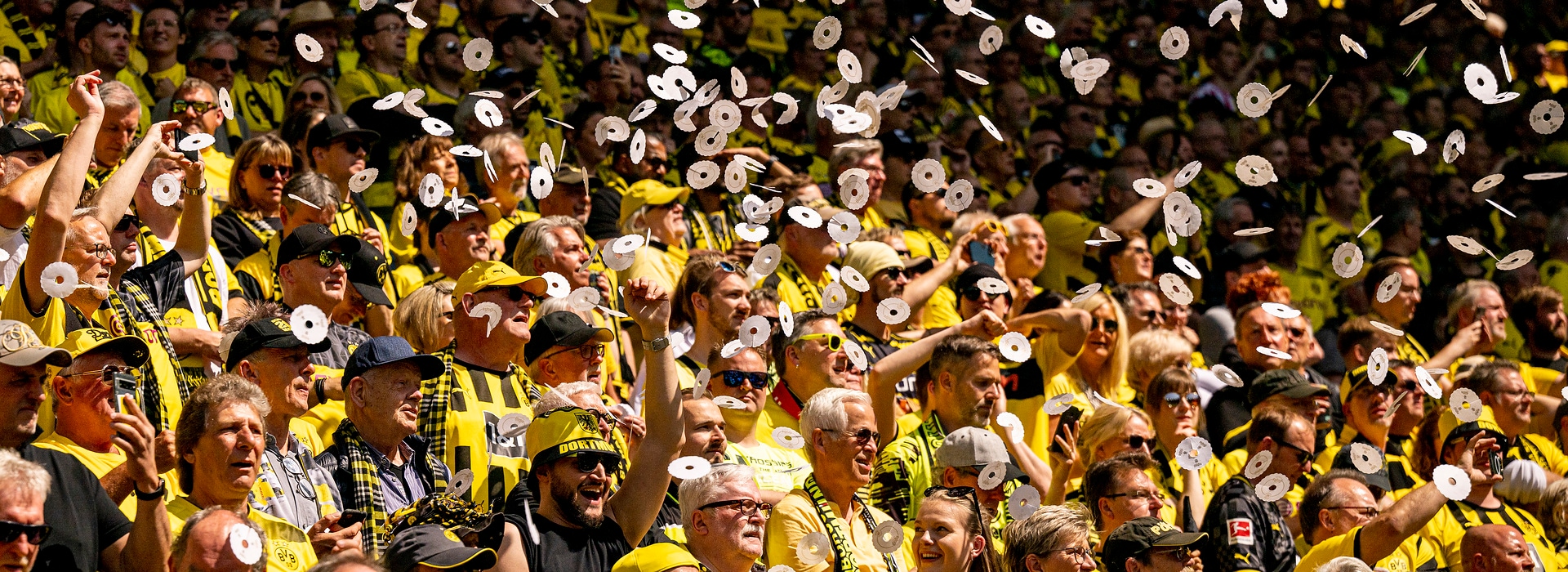
6 November 1982: 54,000 spectators cheer exactly eleven times at Borussia Dortmund’s home match against Arminia Bielefeld. The highest Bundesliga victory in the club’s history ensures a roaring crowd in the stadium. Dortmund’s “rascal” Manni Burgsmüller played a special part in this, putting his personal stamp on the exhilarating football extravaganza with his five-goal performance.
9 April 1997: First leg of the UEFA Champions League semi-final takes place in Dortmund: English champions Manchester United travel to Dortmund with their superstars Cantona, Schmeichel and Beckham. Important pillars of the team are missing with Kohler, Chapuisat and Riedle out injured and Sammer suspended with a yellow card. Rene Tretschok has to play as a substitute striker. After a largely close game, Tretschok stole the ball from his surprised team-mate Paolo Sousa in the 76th minute and tucked it into the top left-hand corner. The goal opens the door to the most important title win in the club’s history and is brought home with Ricken’s legendary title lob against Juventus Turin on 28 May 1997.
7 April 2001: Borussia Dortmund welcomes Bayern Munich for an emotionally charged match of giants. However, the sporting rivalry between red and yellow intensified on that day. Bayern’s excessive tackling not only sends emotions rocketing throughout both the stands and the Borussia Dortmund players, but also the referee Hartmut Strampe. With one yellow card leading to a red, two straight reds and then ten yellows, the match resulted in an unprecedented flood of cards. Only the goal-scorer Santa Cruz and Patrik Andersson leave the pitch without getting a card. The game ends 1-1, the stadium becomes a boiling cauldron of seething Dortmund fans.
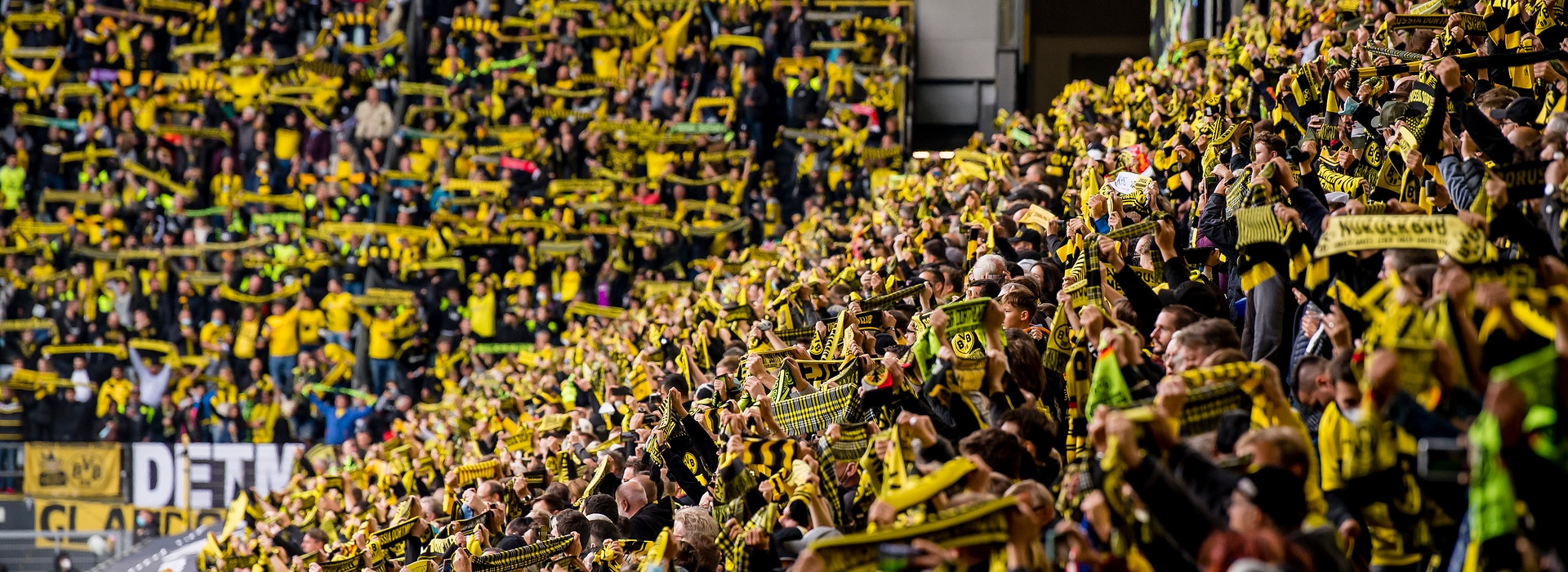
4 May 2002: Heart-stopping final at SIGNAL IDUNA PARK. Borussia Dortmund go into the match against Werder Bremen just one point ahead of Bayer Leverkusen. Bayern are lurking two points behind. Werder take the lead, while the two championship rivals on the other pitches easily play their way to win three points. Koller equalises. Bremen stay in the game and miss a sitter. Then coach Sammer brings on the Brazilian Ewerthon. It took less than 49 seconds for the ball to find its way into the net after a cross from Dede, crowning Dortmund German Champions for the sixth time.
14 June 2006: The summer adventure begins when Germany meets Poland in the group match. The national team plays an outstanding 90 minutes, but the ball just won’t go in the net. When it gets to Dortmund’s David Odonkor in the 91st minute, he volleys it into the Polish penalty area from the right, where Oliver Neuville flies into action and slots it into the net. Germany wins 1-0 and the stadium erupts in sea of black, red and gold.
5 May 2012: After a season of spectacular results, Borussia Dortmund clinched the eighth championship title in the club’s history with a 4-0 gala win over SC Freiburg on the final matchday. With two goals each in the first half, Robert Lewandowski and Jakub Blaszczykowski ensured that shouts of “Deutscher Meister ist nur der BVB” (Only Borussia Dortmund are German champions) echoed through SIGNAL IDUNA PARK until the final whistle. Eight days later, 400,000 people cheer as they welcome the team to Dortmund after winning the first double in the club’s history.
9 April 2013: In the UEFA Champions League quarter-final against Málaga, Borussia Dortmund were still trailing 1-2 in the 90th minute and the referee signalled only three minutes of stoppage time. Mats Hummels hits a long ball into the penalty area with his last ounce of strength. The rebound falls to Marco Reus and he scores the equaliser. Just one minute to go. The whole stadium is on edge. The players push forward. Marco Reus gets a free shot but misses. Somehow the ball gets to Santana and he squeezes it home in the 93rd minute. There are quite a few who claim that the cheers could be heard as far away as Essen.
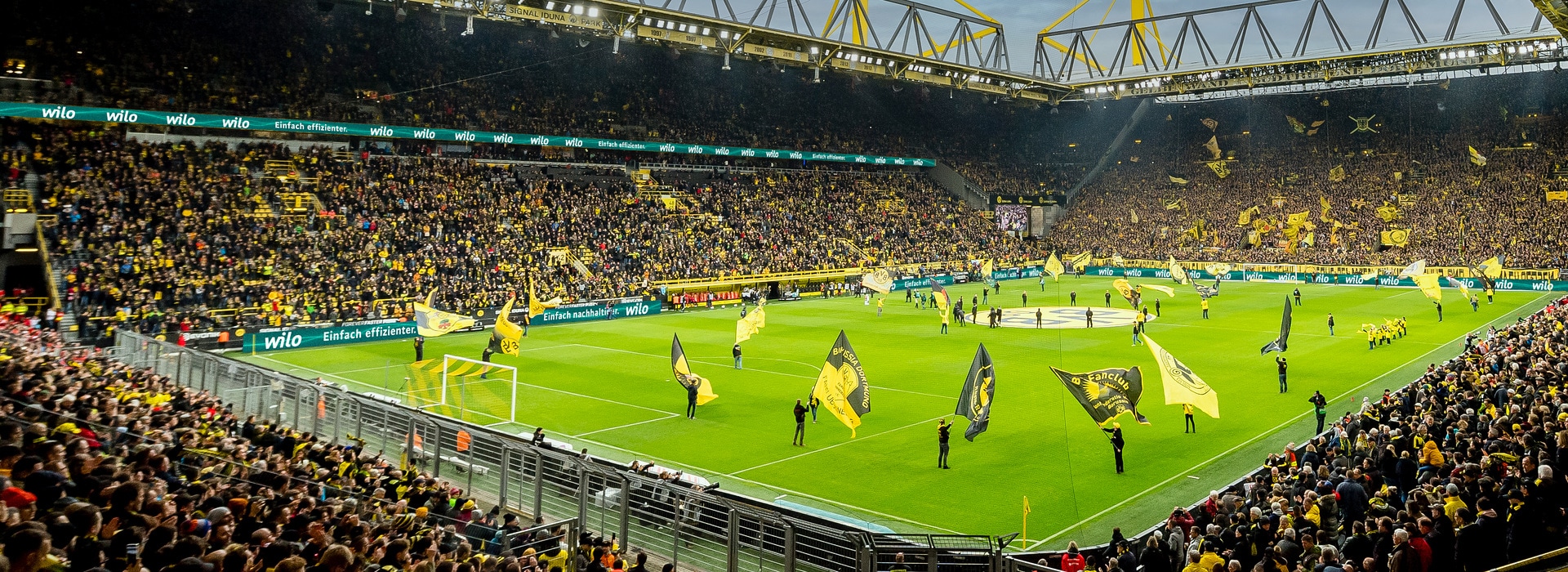
From a pure football stadium to an energy-efficient football temple.
When the former Westfalenstadion was built 50 years ago for the 1974 World Cup, it was the first football-only stadium in Germany. 54,000 spectators were protected by a roof that kept the bad weather outside and the unique atmosphere inside.
The first expansion took place between 1995 and 1999. An upper tier was built for the east and west stands and a VIP area was added into the west stand. The north and south stands were extended in the subsequent second conversion phase, with the south stand being expanded to become the largest terrace in Europe. With the third expansion phase in 2002 and 2003, the stadium reached its current capacity of 81,365 spectators by closing the corners.
In December 2005, the Westfalenstadion was renamed SIGNAL IDUNA PARK. In 2006, just in time for the World Cup, it was equipped with an electronic access system and the VIP areas as well as seats for disabled fans were modernised.
Today, SIGNAL IDUNA PARK is the largest stadium in Germany and one of the largest in Europe. With its eight yellow columns rising 62 metres into the Dortmund sky, it has become a striking part of the cityscape. In the BORUSSEUM, which is connected to the stadium, you can discover the captivating history of the Borussia Dortmund team. In addition to the original jerseys with big names such as Emmerich and Burgsmüller, you will also find the trophies of Borussia Dortmund’s greatest successes.
SIGNAL IDUNA PARK is also well prepared for the 2024 European Football Championship: a new four-storey catering extension for the west stand is under construction and a new pitch is planned for immediately after the end of the Bundesliga season. This provides the best conditions for the four group matches as well as the round of 16 and semi-finals.
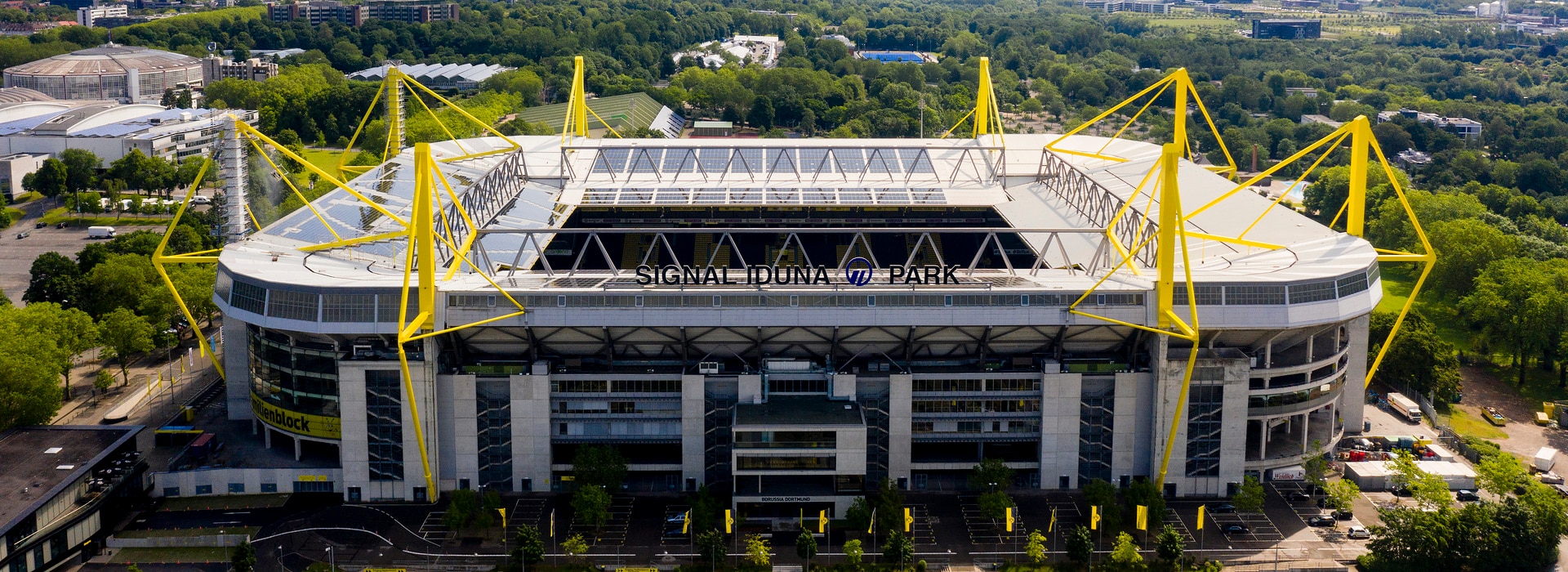
SIGNAL IDUNA PARK: Continuously more efficient.
Borussia Dortmund is the first Bundesliga club to sign up to the UN Global Compact, the world’s largest initiative for sustainable and responsible corporate governance. For SIGNAL IDUNA PARK, this means reducing emissions and using particularly energy-efficient technology without foregoing reliability and high performance.
BVB have been relying on Wilo's reliable system solutions for 25 years now. In a football stadium of this size, water supply poses a particular challenge: water consumption drops during games, but suddenly increases again during breaks.
The innovative technology of the Wilo Group’s high-efficiency pumps offers a customised solution for sustainable and climate-friendly water supply throughout the stadium. From supplying the pitch heating to the sanitary facilities and the exclusive VIP catering – Wilo products ensure a constant and efficient supply of water, regardless of the changing requirements during a match.
Precise control and adjustment of the pump output to the actual demand not only optimises water consumption, but also reduces energy consumption significantly. This not only helps to reduce operating costs but also protects the environment as resources are used efficiently. In this way, Wilo is making an important contribution to the smooth operation and sustainability of the stadium, so that fans and players alike can enjoy the football experience to the full.
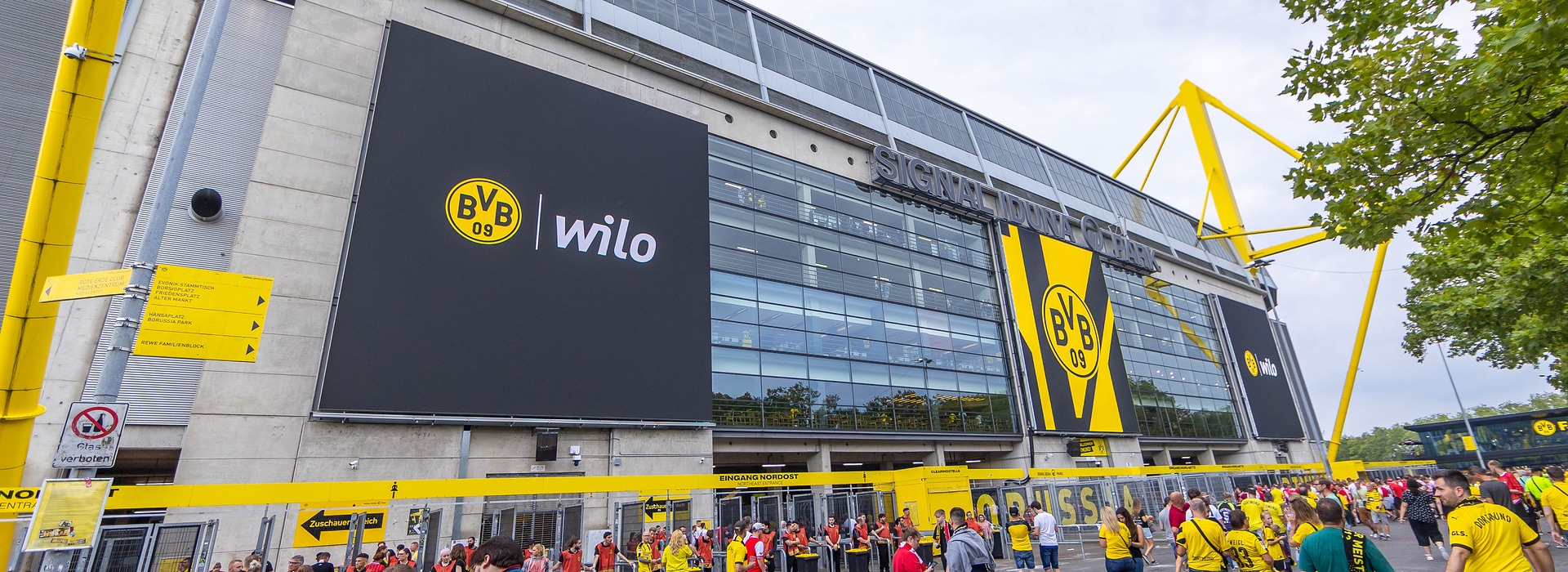
“Echte Liebe” (True Love) and “Pioneering for You”
As one of the “50 Sustainability & Climate Leaders” the multinational technology group Wilo has also been supporting Borussia Dortmund as an official sustainability partner since 2023 in reducing its ecological footprint and in its joint commitment to global sustainability projects. At the same time, the partners have extended their existing Champion partnership until 2026.
The best conditions for a successful future and many more goosebump experiences together at SIGNAL IDUNA PARK.


